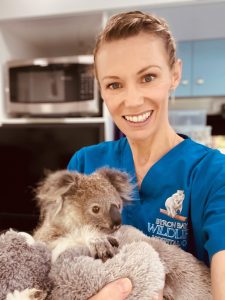Recognising and thanking Australia’s veterinarians on World Vet Day
Australians need to be cognisant of the uniqueness of our native wildlife species, and the increasing challenges they face to exist in their habitats, says one leading wildlife vet on the eve of World Vet Day (Saturday April 30, 2022).
“It saddens me, but I really think Australians take for granted what awesome wildlife we have,” says Dr. Bree Talbot, foundation veterinarian at Byron Bay Wildlife Hospital, Australia’s largest mobile hospital for native animals
“Many people have the attitude ‘oh we’ve got enough of them to ever have to worry about them going extinct’ but look what’s happening to our koalas. As a vet I love doing what I can to save our wildlife and when my kids grow up, I want them to see all the amazing creatures Australia has to offer.”
Saturday April 30 is World Veterinary Day. Organised by the World Veterinary Association to celebrate and support our front-line animal health practitioners, this year’s theme is ‘strengthening veterinary resilience’ as vets around the world experience increasing workloads and mental health conditions.
Dr. Talbot works in northern NSW, out of Matilda, a customised semi-trailer vet hospital, funded by donations, which provides critical care to our wildlife daily and during Australia’s natural disasters. Last month, her team was at the forefront of efforts to help wildlife injured in the Lismore and Northern Rivers floods. During the catastrophic Black Summer bushfires of December 2019, with a two-year-old and a nine-week-old baby at home, Bree instructed vets at the fire front via telehealth on how to treat burnt and dehydrated wildlife such as koalas, kangaroos, wombats, possums, birds, reptiles and other animal species. Two thousand patients have been treated since Byron Bay Wildlife Hospital’s mobile clinic opened in February 2021.
“60% of our caseload is native birds from your more common rainbow lorikeets and kookaburras right through to raptors and seabirds,” says Bree. “Then 15-20% is reptiles, 15-20% mammals and the rest are amphibians. Anything that is a wild animal.”
An estimated three billion native animals perished or were displaced in the Black Summer bushfires with the number of wildlife and livestock destroyed in the recent floods yet to be estimated. Some days, says Bree, the enormity of the struggle facing her patients can feel immense.
“Our native wildlife was already on the back foot after the fires and the species that went extinct in the fires, we can never get back. There is no insurance policy and that makes me sad, but it also makes me want to work harder to try and save the lives of the injured wildlife we can.”
Ben Stapley, executive director of Animal Medicines Australia whose members supply veterinary medicines critical to treating sick and injured wildlife, says vets are imperative to the ongoing health and wellbeing of all Australia’s animals.
“Vets’ roles in caring for the health and welfare of our domestic, native and agricultural sector animals should never be underestimated. Whether a cat, cow or koala, vets provide an essential, valuable and professional service that results in far superior animal health and welfare outcomes,” said Mr. Stapley

For Bree, treating patients suffering injury or trauma, animal medicines are an essential part of her work.
“The role that animal medicines play in helping our native wildlife is vital; we can’t do our job without them,” says Bree.
“Whether an animal is burnt in bushfires, caught in floods or attacked by a dog, they need analgesics, fluids and sometimes antibiotics. But they can’t say how much pain they are in, or where it hurts, so I need to use my own investigations, and then use the medications appropriately to make these little guys feel better.”
Bree holds out hope for new native animal vaccines currently being trialed in Australia to prevent chlamydia in koalas. She would welcome further research into safeguarding our native wildlife from emerging diseases, and an increased push to conserve our wildlife’s habitats, she says.
“As a vet, on occasion there are long days, and there are sad days, but releasing a native animal back into its natural environment is what makes it all worth it for me.”
